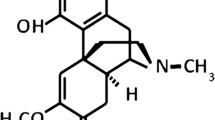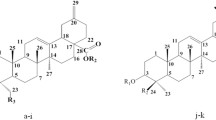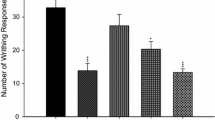Abstract
This study was designed to investigate the anti-inflammatory, analgesic activity of azadirone from Toona sinensis (Juss.) M. Roem., Meliaceae, and explore its potential mechanisms. Anti-inflammatory activities of azadirone were evaluated using dimethylbenzene-induced ear edema, acetic acid–induced vascular permeability, and cotton ball granuloma in mice; in addition, its analgesic activities were investigated using acetic acid writhing, hot plate pain, and formalin pain tests. The results showed that azadirone had obvious anti-inflammatory and analgesic effects in animals. Further studies revealed that azadirone can reduce levels of TNF-α, IL-6, and IL-1 in lipopolysaccharide-stimulated RAW 264.7 cells. In addition, azadirone can downregulate COX-2 and substance P in spinal cord tissues of formalin-stimulated mice. Also, expressions of ERK, P38, and JNK in RAW 264.7 cells were suppressed by azadirone. Collectively, azadirone has promising anti-inflammatory and analgesic potentials, and its mechanism is closely related to the reduction of pro-inflammatory cytokines and the blocking of MAPK signal pathway.

Graphical Abstract





Similar content being viewed by others
References
Arulselvan P, Fard MT, Tan WS, Gothai S, Fakurazi S, Norhaizan ME, Kumar SS (2016) Role of antioxidants and natural products in inflammation. Oxidative Med Cell Longev. https://doi.org/10.1155/2016/5276130
Chen YC, Chen HJ, Huang BM, Chen YC, Chang CF (2019) Polyphenol-rich extracts from Toona sinensis bark and fruit ameliorate free fatty acid-induced lipogenesis through AMPK and LC3 pathways. J Clin Med 8:1664. https://doi.org/10.3390/jcm8101664
Chianese G, Yerbanga SR, Lucantoni L, Habluetzel A, Basilico N, Taramelli D, Fattorusso E, Taglialatela-Scafati O (2010) Antiplasmodial triterpenoids from the fruits of neem, Azadirachta indica. J Nat Prod 8:1448–1452. https://doi.org/10.1021/np100325q
Dong XJ, Zhu YF, Bao GH, Hu FL, Qin GW (2013) New limonoids and a dihydrobenzofuran norlignan from the roots of Toona sinensis. Molecules 18:2840–2850. https://doi.org/10.3390/molecules18032840
Duggan AW, Hendry IA, Morton CR, Hutchison WD, Zhao ZQ (1988) Cutaneous stimuli releasing immunoreactive substance P in the dorsal horn of the cat. Brain Res 451:261–273. https://doi.org/10.1016/0006-8993(88)90771-8
Gupta SC, Francis SK, Nair MS, Mo YY, Aggarwal BB (2013) Azadirone, a limonoid tetranortriterpene, induces death receptors and sensitizes human cancer cells to tumor necrosis factor-related apoptosis-inducing ligand (TRAIL) through a p53 protein-independent mechanism: evidence for the role of the ROS-ERK-CHOP-death receptor pathway. J Biol Chem 45:32343–32356. https://doi.org/10.1074/jbc.M113.455188
Li Q, Yang S, Yang S, Xin F, Wang M (2015) Anti-inflammatory activity of phlomisoside F isolated from Phlomis younghusbandii Mukerjee. Int Immunopharmacol 28:724–730. https://doi.org/10.1016/j.intimp.2015.07.035
Mantovani A, Allavena P, Sica A, Balkwill F (2008) Cancer-related inflammation. Nature 454:436–444. https://doi.org/10.1038/nature07205
Mitsui K, Saito H, Yamamura R, Fukaya H, Hitotsuyanagi Y, Takeya K (2007) Apotirucallane and tirucallane triterpenoids from Cedrela sinensis. Chem Pharm Bull 55:1442–1447. https://doi.org/10.1248/cpb.55.1442
Nanduri S, Thunuguntla SS, Nyavanandi VK, Kasu S, Kumar PM, Ram PS, Rajagopal S, Kumar RA, Deevi DS, Rajagopalan R, Venkateswarlu A (2003) Biological investigation and structure-activity relationship studies on azadirone from Azadirachta indica A. Juss. Bioorg Med Chem Lett 13:4111–4115. https://doi.org/10.1016/j.bmcl.2003.08.030
Peng W, Liu Y, Hu M, Zhang M, Yang J, Liang F, Huang Q, Wu C (2019) Toona sinensis: a comprehensive review on its traditional usages, phytochemisty, pharmacology and toxicology. Rev Bras Farmacogn 29:111–124. https://doi.org/10.1016/j.bjp.2018.07.009
Rea IM, Gibson DS, McGilligan V, McNerlan SE, Alexander HD, Ross OA (2018) Age and age-related diseases: role of inflammation triggers and cytokines. Front Immunol 9:586. https://doi.org/10.3389/fimmu.2018.00586
Ren Q, Guo F, Tao S, Huang R, Ma L, Fu P (2019) Flavonoid fisetin alleviates kidney inflammation and apoptosis via inhibiting Src-mediated NF-κB p65 and MAPK signaling pathways in septic AKI mice. Biomed Pharmacother 122:109772. https://doi.org/10.1016/j.biopha.2019.109772
Siddiqui BS, Rasheed M, Naqvi SNH, Tariq RM (2000) Biologically active triterpenoids of biogenetic interest from the fresh fruit coats of Azadirachta indica. Tetrahedron 56:3547–3551. https://doi.org/10.1016/S0040-4020(00)00244-1
Shamsi Meymandi M, Sepehri G, Izadi G, Zamiri Z (2019) Evidence for antinociceptive effects of combined administration of vitamin E and celecoxib in tail-flick and formalin test in male rats. Pharmacol Rep 71:457–464. https://doi.org/10.1016/j.pharep.2019.02.005
Wang QS, Yang L, Cui WY, Chen L, Jiang YH (2014) Anti-inflammatory and analgesic activities of methanol extract from aerial part of Phlomis younghusbandii Mukerjee. PLoS One 9:e89149. https://doi.org/10.1371/journal.pone.0089149
Wu JG, Peng W, Yi J, Wu YB, Chen TQ, Wong KH, Wu JZ (2014) Chemical composition, antimicrobial activity against Staphylococcus aureus and a pro-apoptotic effect in SGC-7901 of the essential oil from Toona sinensis (A. Juss.) Roem. leaves. J Ethnopharmacol 154:198–205. https://doi.org/10.1016/j.jep.2014.04.002
Yalta T, Yalta K (2018) Systemic inflammation and arrhythmogenesis: a review of mechanistic and clinical perspectives. Angiology 69:288–296. https://doi.org/10.1177/0003319717709380
Yeung YT, Aziz F, Guerrero-Castilla A, Arguelles S (2018) Signaling pathways in inflammation and anti-inflammatory therapies. Curr Pharm Des 24:1449–1484. https://doi.org/10.2174/1381612824666180327165604
Zhang K, Zeng X, Chen Y, Zhao R, Wang H, Wu J (2017) Therapeutic effects of Qian-Yu decoction and its three extracts on carrageenan-induced chronic prostatitis/chronic pelvic pain syndrome in rats. BMC Complement Altern Med 17:1–11. https://doi.org/10.1186/s12906-016-1553-7
Zhang L, Fan Y, Su H, Wu L, Huang Y, Zhao L, Han B, Shu G, Xiang M, Yang JM (2018) Chlorogenic acid methyl ester exerts strong anti-inflammatory effects via inhibiting the COX-2/NLRP3/NF-κB pathway. Food Funct 9:6155–6164. https://doi.org/10.1039/C8FO01281D
Zhang Q, Peng W, Wei S, Wei D, Li R, Liu J, Peng L, Yang S, Gao Y, Wu C, Pu X (2019) Guizhi-Shaoyao-Zhimu decoction possesses anti-arthritic effects on type II collagen-induced arthritis in rats via suppression of inflammatory reactions, inhibition of invasion and migration and induction of apoptosis in synovial fibroblasts. Biomed Pharmacother. https://doi.org/10.1016/j.biopha.2019.109367
Author information
Authors and Affiliations
Contributions
HLZ contributed in the collection of T. sinensis samples, compound preparation, running laboratory works, analysis of data, and writing manuscript. MZL contributed in running laboratory works, compound preparation, and analysis of data; designed the studies; reviewed data; wrote and reviewed manuscript; designed and discussed the studies.
Corresponding author
Ethics declarations
Conflict of Interest
The authors declare that they have no conflicts of interest.
Rights and permissions
About this article
Cite this article
Li, M., Zhang, H. Azadirone from Toona sinensis possesses anti-inflammatory and analgesic activities via suppressing MAPK signal pathway. Rev. Bras. Farmacogn. 30, 494–502 (2020). https://doi.org/10.1007/s43450-020-00063-z
Received:
Accepted:
Published:
Issue Date:
DOI: https://doi.org/10.1007/s43450-020-00063-z




